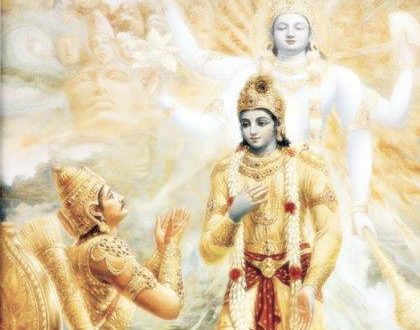‘Yogah Karmasu Kaushalam.”
–Bhagavad Gita; Ch. 2; 50
By Suresh Kurl
“Yogah Karmasu Kaushalam” refers to the therapeutic and philosophical conversation that took place between Lord Krishna and Arjuna, his cousin, friend and his follower, on Karma-yoga.
The background is this conversation is on the succession of the Hasthinapur dynasty, and the question is, “Who has the right to inherit and govern it: the Pandavas or Kauravas?
When all attempts to peacefully resolve the succession dispute failed, war seemed the only option. Both families accepted the option; the Pandavas reluctantly and Kaurvas rather gleefully. And that was how the historic war of the Mahabharata started.
When, as warriors, the Pandavas and Kauravas stood face-to-face in the battle field, Arjuna spotting some of his most beloved and revered elders standing on the enemy side became nervous.
Krishna, who had agreed to pilot Arjuna’s chariot in the battle field, noticed his friend looking pale with the thought of not only killing the Kaurvas, but even fighting his elders to protect his rights.
Krishna encouraged Arjuna to stand up and fulfill his karmic obligation (dharma) and protect the dynasty from the morally reprehensible and evil Kauravas with the following words:
“Person disciplined in mental attitude leaves behind both good and evil deeds in this world. Discipline thyself into performing your duty; excellence in action is yoga.”
—Bhagavad Gita; Ch. 2; 50
That said I feel obliged to explain what karma means the India philosophy, as the word has been much too commercialised in the western world — Credit karma!
What is Karma? Karma literally means action. Philosophically and spiritually speaking, “The law of karma says that everything that happens, happens only because of the existence of antecedent causes and itself becomes the cause of subsequent effects. As we sow, so we reap. … This law holds in every sphere of life, physical as well as moral;” – Dr. Radhakrishnan; Religion in a Changing World; pg. 144; Humanities Press, London.
For those, who believe in rebirth, as the followers of Hinduism, Buddhism, Jainism and Sikhism, karma is the outcome of karma of previous his life; his destiny, which could be considered an accident by a non-believer.
I am a strong believer and have believed that the birth of a child in a royal family, as opposed to be in the family of a die-hard criminal or in a poor family living hand to mouth, is the out come of his good or bad karma of the life he had lived before.
An individual’s karma could also be moulded or influenced by the karma of the individuals, who raised him. There are numerous studies on this subject. I have had several close encounters with such individuals whose lives had been moulded by their guardians, members in his extended family, including his parents’ in-and-out boy or girl friends.
For example, “The AFL player Andrew Krakouer and his brother Tyrone Krakouer both spent time in jail for an assault outside a Fremantle nightclub in December 2006. Their famous foot-balling father, Jim Krakouer, had been jailed in 1996 for drug trafficking.” —Parents can pass criminality on to children; Sidney Morning Herald; May 10] 2011.
What is Karma-Yogah? It is your focused dedication to action without attachment to the ensuing rewards. A karma to qualify as yoga must have six ingredients:
- A noble and principled objective.
- Intellectual honesty void of ulterior motives.
- Commitment and faith to do only what is right. A combination of commitment, faith and your objective to do what is right give rise to aspiration.
- Focused performance. Attention deficit individuals will have difficult time to become a karma-yogi. This is one reason to practice
- Physical-capability complimentary to the goal and
- Absence of attachment to the ensuing rewards.
Karmanye vadhikaraste ma phaleshu kadachana,
Ma karmaphalaheturbhurma te sangostvakarmani.
Focus on action not on its reward; neither the reward of action be your desire;
nor should you be attached to inaction. —Bhagavad Gita; Ch. 2-47
Come to think of it, staying detached from ensuing rewards is an insurance against disappointments, depression and loss of self-esteem.
What does not qualify as Karma-Yogah? Absence of humility in the delivery of service defeats efforts from achieving the status of Karma-Yoga. Krishna, after winning the Mahabharata war, never went around bragging that the Pandavas won their war because of him.
Karma has to be unlike an election campaign packed with glorious promises, but actually focused on winning the election. Mario Cuomo’s keynote speech at the Democratic National Convention in San Francisco, 1984, “You campaign in poetry; you govern in prose,” is an example of duplicity; no where near karma-Yoga.
Or like the 2008 Chinese infant-milk-formula, adulterated with melamine, instead of protein as promoted. Reportedly it killed dozens of babies, did not nourish a single baby.
However, despite all the duplicity and greed, the world is not empty of Karma-Yogis. Three names come to mind: Bill and Melinda Gates and Warren Buffett. Their primary aim is to enhance healthcare and reduce extreme poverty and expand education. Believe it not, they do not even believe in God.
But you do not have to super rich or an atheist to be Karma-Yogis. In my books, the US Dr. Bennet Omalu certainly qualifies for this status. He worked very hard to serve his patients, the football players, despite being tortured with on going racial comments by his medical colleagues. Why, because he was very bright, committed to his work and was not white. He was black, born in Nigeria not in the USA. Yet he kept working harder and harder, even investing his life savings and professional reputation to uncover the fact that the National Football League players were not dying of Alzheimer’s, as the NFL authorities continued to claim to protect their own professional reputation. They were dying of brain concussion the fact the NFL did not care to know for a long time.
I know it is not easily to stay divorced from the ensuing rewards, but we do not have to be criminally married to rewards alone.
Suresh Kurl is a former university professor; a retired Registrar of the BC Benefits Appeal Board, a former Member of the National Parole Board, a writer, a Public Speaker.
 Desi Today Magazine
Desi Today Magazine




